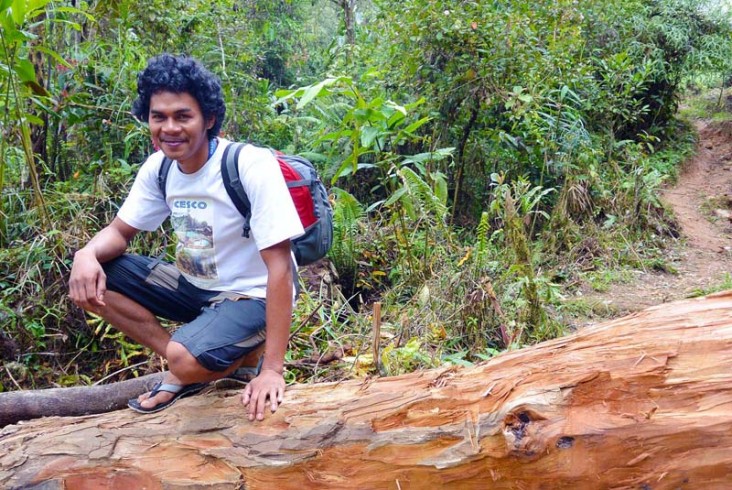
May 2015— Natural resources provide food, water, energy, tourist attractions, medicines and flood control throughout the Philippines. Named one of the world’s 18 “megadiversity countries” by Conservation International, the Philippines is home to more than 20,000 endemic plants and animals.
Meanwhile, illegal wildlife trade and deforestation deplete these species and their habitats, destabilizing the nation.
In 2012, USAID launched the five year, $22.5 million Biodiversity and Watersheds Improved for Stronger Economy and Ecosystem Resilience (B+WISER) Program to help the Philippines conserve biodiversity, manage forests, support low emissions, and contribute to disaster risk reduction in seven protected areas in the country.
Key to the program’s success are partners like Joel Mabandos, 27, who guides trekkers in Mindanao’s Mount Apo Natural Park. A home to unique plants and animals, the park, a 64,053-hectare protected area in southern Philippines, boasts the country’s highest peak, attracting tourists and providing livelihoods for its inhabitants.
Guides like Mabandos earn about $8 per day—well above the local $6 minimum wage. His earnings contribute to his household income and send his siblings to school.
“I have been a guide since I was 14. This job is fulfilling. I’ll probably get old doing the same thing,” said Mabandos. He is a Manobo, an indigenous people of Mindanao. His family has tended to the mountain for generations.
Manobo people regard the park as a sacred place but, increasingly, others cut trees illegally and use the forest for agriculture and settlement. Coupled with the traffic of more than 6,000 visitors annually, the park is at grave risk if left unregulated.
USAID partnered with local governments and indigenous people to save the park. Guides were trained to become stewards of the forest, protecting endangered flora and fauna from climbers who litter garbage and capture wildlife. Today, Mabandos is a wildlife enforcement officer.
“This is my first ever formal training. I am more capable to watch for offenders. We must preserve the park so that people will continue to enjoy its beauty,” he said.
In December 2014, 400 volunteers collected 2.6 tons of littered garbage, prompting a local senator to direct more Philippine Government aid to protect the country’s mountains.
In February 2015, USAID helped the Mount Apo Management Board pass a common policy, allowing the park's local governments to better manage the trails, campsites, waste, guides, tourist traffic and fees. Two of the six local governments have already passed ordinances adopting the policy. The policy includes a 10 percent increase in fees and penalties to generate more than $70,000 annually for the park and boost income for the 450 mountain guides.
According to Joey Recimilla, chairman of a local ecotourism committee, uncontrolled trekking and littered garbage harms Mount Apo’s biodiversity. “With the new policy, we can control the volume of climbers to maintain the natural ecosystem, conserve biodiversity, and restore the forest,” he said.
Today, a cadre of eco-champions look after the park. Meanwhile, Mabandos protects his corner of the mountain, helping his family and the forest thrive for generations to come.
LINKS
Follow @USAID_Manila, on Facebook, on Flickr, on YouTube







Comment
Make a general inquiry or suggest an improvement.